WALL-E
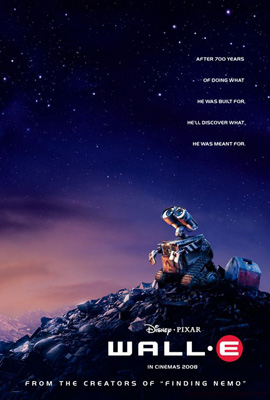
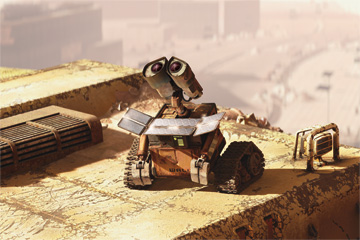 The story opens on a ravaged Earth in the far-off future. We learn through discarded video recordings that 700 years ago, the planet became so polluted as to be inhabitable for humanity. Humans have gone off into space, and have left behind little robots known as WALL-Es ("Waste Allocation Load Litter Earth class") to compact the garbage left behind and make the world liveable once more. We see one little WALL-E going about his work. Judging by the discarded remains of his fellow bots, it seems that he is the last of his kind left functioning. We can tell from the moment that we meet him that he seems to possess a soul of some sort. He is naturally curious about much of the trash he collects, and saves most of it for a personal collection he keeps in his bunker. His most prized possession is an old tape of the movie musical, Hello Dolly, which he watches and studies every night with great interest. The moment of the film he watches continuously contains a scene where a man and a woman hold hands in a park. He obviously longs for companionship. With his fellow workers long-dormant, and his only friend being a cockroach he discovered amongst the trash, the little WALL-E obviously longs for more than the desolate and solitary life he has been accustomed to.
The story opens on a ravaged Earth in the far-off future. We learn through discarded video recordings that 700 years ago, the planet became so polluted as to be inhabitable for humanity. Humans have gone off into space, and have left behind little robots known as WALL-Es ("Waste Allocation Load Litter Earth class") to compact the garbage left behind and make the world liveable once more. We see one little WALL-E going about his work. Judging by the discarded remains of his fellow bots, it seems that he is the last of his kind left functioning. We can tell from the moment that we meet him that he seems to possess a soul of some sort. He is naturally curious about much of the trash he collects, and saves most of it for a personal collection he keeps in his bunker. His most prized possession is an old tape of the movie musical, Hello Dolly, which he watches and studies every night with great interest. The moment of the film he watches continuously contains a scene where a man and a woman hold hands in a park. He obviously longs for companionship. With his fellow workers long-dormant, and his only friend being a cockroach he discovered amongst the trash, the little WALL-E obviously longs for more than the desolate and solitary life he has been accustomed to.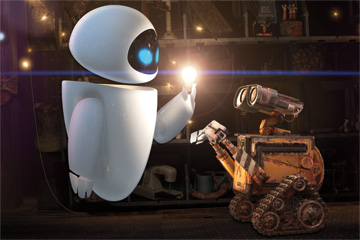 So what is he to think when a ship unexpectedly descends upon Earth one day, and deposits an EVE ("Extraterrestrial Vegetation Evaluator") robot to search for signs of new plant life growing on the planet? The WALL-E is fascinated by its graceful flying movements, yet intimidated by the high tech weaponry the EVE possesses. (The EVE seems to be very jumpy, considering it draws its powerful blaster on just about anything that moves.) Eventually, WALL-E is able to work up the courage to introduce himself, and their strange courtship begins. Like WALL-E, EVE seems to contain a soul of some sort, and she is equally fascinated by the things he has collected over time when he brings her to his home. Their budding relationship is brought to an abrupt end when the EVE discovers a sample of plant life growing amongst the ruins of Earth, and must immediately return to the ship that brought her here. Wanting to follow her, the WALL-E clings onto the outside of her ship, and follows his companion beyond the stars.
So what is he to think when a ship unexpectedly descends upon Earth one day, and deposits an EVE ("Extraterrestrial Vegetation Evaluator") robot to search for signs of new plant life growing on the planet? The WALL-E is fascinated by its graceful flying movements, yet intimidated by the high tech weaponry the EVE possesses. (The EVE seems to be very jumpy, considering it draws its powerful blaster on just about anything that moves.) Eventually, WALL-E is able to work up the courage to introduce himself, and their strange courtship begins. Like WALL-E, EVE seems to contain a soul of some sort, and she is equally fascinated by the things he has collected over time when he brings her to his home. Their budding relationship is brought to an abrupt end when the EVE discovers a sample of plant life growing amongst the ruins of Earth, and must immediately return to the ship that brought her here. Wanting to follow her, the WALL-E clings onto the outside of her ship, and follows his companion beyond the stars.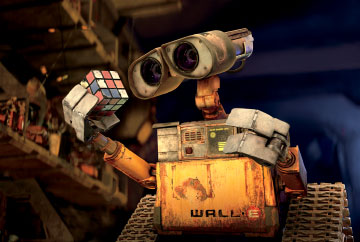 All of this happens during the first 40 minutes or so of the film, and the only genuine dialogue we've heard is from old clips of Hello Dolly, and some discarded video messages from the President (a live action Fred Willard) who explains what has happened to the Earth. It may be a gamble convincing kids to sit still through characters who don't even really speak, but it's a gamble I'm glad the filmmakers at Pixar took. WALL-E and EVE do speak to one another at times, their voices provided by Ben Burtt and Elisa Knight respectively. But really, it's up to the animators to tell their story through their eyes and motions. The first half set on Earth is truly unlike any other animated film. We're introduced to the lead character, doing the job he's been left behind for on Earth, and our heart immediately goes out for him. He looks kind of like a cross between E.T. and the robot from the Short Circuit films, and his boxy appearance makes him look downright awkward for the task of restoring the Earth. At the same time, it's these features that immediately make us reach out for him. His curiosity, his willingness to learn, and the obvious vulnerability he holds due to the fact that he seems to hold a sort of soul. Whether he was programmed with this curiosity and need for companionship, or if it was something he developed over time is left up to us to decide. The fact that EVE seems to possess many of the same qualities made me wonder.
All of this happens during the first 40 minutes or so of the film, and the only genuine dialogue we've heard is from old clips of Hello Dolly, and some discarded video messages from the President (a live action Fred Willard) who explains what has happened to the Earth. It may be a gamble convincing kids to sit still through characters who don't even really speak, but it's a gamble I'm glad the filmmakers at Pixar took. WALL-E and EVE do speak to one another at times, their voices provided by Ben Burtt and Elisa Knight respectively. But really, it's up to the animators to tell their story through their eyes and motions. The first half set on Earth is truly unlike any other animated film. We're introduced to the lead character, doing the job he's been left behind for on Earth, and our heart immediately goes out for him. He looks kind of like a cross between E.T. and the robot from the Short Circuit films, and his boxy appearance makes him look downright awkward for the task of restoring the Earth. At the same time, it's these features that immediately make us reach out for him. His curiosity, his willingness to learn, and the obvious vulnerability he holds due to the fact that he seems to hold a sort of soul. Whether he was programmed with this curiosity and need for companionship, or if it was something he developed over time is left up to us to decide. The fact that EVE seems to possess many of the same qualities made me wonder.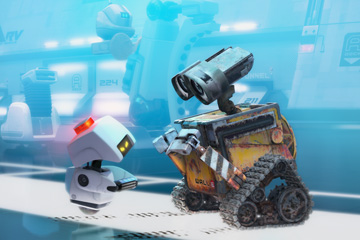 It takes a certain kind of trust with your audience to pull something like this off. You have to trust in their intelligence and their willingness to follow two characters who are not even human to begin with, and speak mainly in chips and whistles. We go along with it, though, because the movie is so captivating in the world it creates, and because of the characters themselves. It's when WALL-E and EVE leave Earth behind that the solid foundation and trust that the film has built up until now starts to falter. We're introduced to the humans who have left Earth so long ago. They have been living in a space colony, waiting for a sign that they can return home. The thing is, they have become so content with life that they are now pretty much obsolete. The humans are morbidly obese, rely on machines to do everything, controlled by consumerism and shallow corporations, and have basically become completely incapable of doing anything by themselves, even standing up. To say that this is heavy handed is an understatement. The film's artful and subtle atmosphere flies completely out the window at this point, and basically starts ramming its message into our heads with all the subtlety of a jackhammer. The plot of the second half of the film revolves around the Captain of the space colony (voice by Jeff Garlin) slowly learning about what life was like on Earth before humans became completely dependent on machines, and trying to overthrow the ship's central computer (which bears a striking physical resemblance to HAL, the evil computer from 2001), who does not want things to change.
It takes a certain kind of trust with your audience to pull something like this off. You have to trust in their intelligence and their willingness to follow two characters who are not even human to begin with, and speak mainly in chips and whistles. We go along with it, though, because the movie is so captivating in the world it creates, and because of the characters themselves. It's when WALL-E and EVE leave Earth behind that the solid foundation and trust that the film has built up until now starts to falter. We're introduced to the humans who have left Earth so long ago. They have been living in a space colony, waiting for a sign that they can return home. The thing is, they have become so content with life that they are now pretty much obsolete. The humans are morbidly obese, rely on machines to do everything, controlled by consumerism and shallow corporations, and have basically become completely incapable of doing anything by themselves, even standing up. To say that this is heavy handed is an understatement. The film's artful and subtle atmosphere flies completely out the window at this point, and basically starts ramming its message into our heads with all the subtlety of a jackhammer. The plot of the second half of the film revolves around the Captain of the space colony (voice by Jeff Garlin) slowly learning about what life was like on Earth before humans became completely dependent on machines, and trying to overthrow the ship's central computer (which bears a striking physical resemblance to HAL, the evil computer from 2001), who does not want things to change.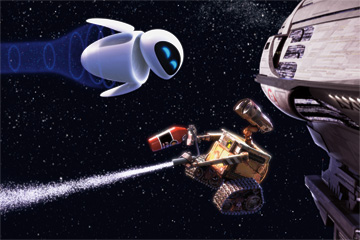 I was enjoying WALL-E as an artful and simple love story, but when it tries to become a message movie, things turn a lot more chaotic and sloppy. We get a lot of chase scenes as WALL-E and EVE must fend off battle robots, and race around the space station, trying to deliver the plant life safely to the Captain. That's not to say the movie completely loses its way. There is an absolutely beautiful scene where the two robots share a zero gravity dance with one another outside of the ship that took me back to the feelings the film had previously brought forth. And yet, the confused nature of the film during the second half started to irritate me just a little. WALL-E seems to want to have it both ways. It wants to be thoughtful and intelligent, but it also wants to be overbearing and ridiculous. Was there a behind the scenes struggle as to what kind of audience the story should aim for? Its combination of high brow and low brow certainly seems to suggest that. While the movie constantly engaged me, I felt a little bit more engaged when the movie wasn't trying to make its point so forcefully. This is a movie on the cusp of greatness. All it needed was a more level notion of just where it was going.
I was enjoying WALL-E as an artful and simple love story, but when it tries to become a message movie, things turn a lot more chaotic and sloppy. We get a lot of chase scenes as WALL-E and EVE must fend off battle robots, and race around the space station, trying to deliver the plant life safely to the Captain. That's not to say the movie completely loses its way. There is an absolutely beautiful scene where the two robots share a zero gravity dance with one another outside of the ship that took me back to the feelings the film had previously brought forth. And yet, the confused nature of the film during the second half started to irritate me just a little. WALL-E seems to want to have it both ways. It wants to be thoughtful and intelligent, but it also wants to be overbearing and ridiculous. Was there a behind the scenes struggle as to what kind of audience the story should aim for? Its combination of high brow and low brow certainly seems to suggest that. While the movie constantly engaged me, I felt a little bit more engaged when the movie wasn't trying to make its point so forcefully. This is a movie on the cusp of greatness. All it needed was a more level notion of just where it was going.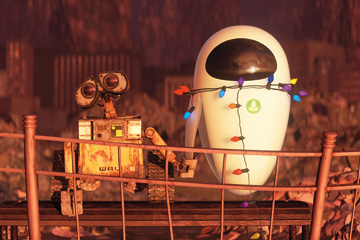
See the movie times in your area or buy the DVD at Amazon.com!






0 Comments:
Post a Comment
<< Home